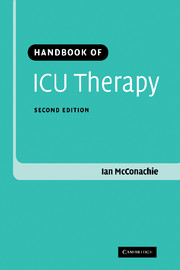Book contents
- Frontmatter
- Contents
- List of contributors
- Preface
- Part I Basic principles
- Part II Specific problems
- 17 The surgical patient in the ICU
- 18 The trauma patient
- 19 Acute coronary syndromes
- 20 Heart failure
- 21 Arrhythmias
- 22 The patient with sepsis
- 23 Acute renal failure in the critically ill
- 24 Acute lung injury and ARDS
- 25 The patient with gastrointestinal problems
- 26 The comatose patient
- 27 The critically ill asthmatic
- 28 The critically ill diabetic
- 29 The cardiac surgical patient in the ICU
- 30 Cardiac arrest
- Index
27 - The critically ill asthmatic
Published online by Cambridge University Press: 24 August 2009
- Frontmatter
- Contents
- List of contributors
- Preface
- Part I Basic principles
- Part II Specific problems
- 17 The surgical patient in the ICU
- 18 The trauma patient
- 19 Acute coronary syndromes
- 20 Heart failure
- 21 Arrhythmias
- 22 The patient with sepsis
- 23 Acute renal failure in the critically ill
- 24 Acute lung injury and ARDS
- 25 The patient with gastrointestinal problems
- 26 The comatose patient
- 27 The critically ill asthmatic
- 28 The critically ill diabetic
- 29 The cardiac surgical patient in the ICU
- 30 Cardiac arrest
- Index
Summary
The chapter highlights two main features:
Acute severe asthma should be considered the unstable angina of respiratory medicine.
Asthma kills.
Incidence
In many countries, in the 30–40 years up to 2000, there was a steep rise in hospital admissions for asthma, accounting for ≈100,000 per year in England and Wales, half of which were <15 years of age. In children, males have a higher admission rate than females, the opposite being true for adults. In the UK there had been a similar but less marked increase in asthma deaths, which latterly seems to be falling slowly probably because of better long-term prophylactic treatment.
Over the period 1995–2001, acute severe asthma accounted for 1.7% of admissions to adult general critical care units across England, Wales and Northern Ireland. Of these, 57% were mechanically ventilated within the first 24 h. Unit mortality was 7.1% and hospital mortality 9.8%[1].
Causes
Asthma is an inflammatory disease of the lower airways that may be associated with specific identifiable allergy (atopic or extrinsic asthma) or not (non-atopic or intrinsic asthma). The latter starts more commonly in mid-and late adult life.
It is a disease of exacerbation with either full remission or persistence of symptoms (chronic severe asthma). Exacerbation may be due to:
specific allergen exposure — environmental, food or occupational,
air pollution — gaseous or particulate,
treatment non-compliance,
infection — viral or bacterial,
thunderstorms.
- Type
- Chapter
- Information
- Handbook of ICU Therapy , pp. 381 - 391Publisher: Cambridge University PressPrint publication year: 2006



